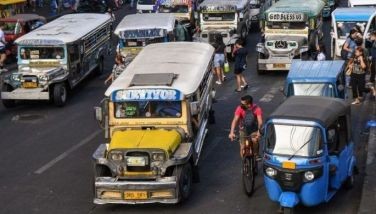Research group warns: Cases may hit 230,000

MANILA, Philippines — The number of coronavirus disease 2019 cases may reach 230,000 by the end of the month as Metro Manila and nearby provinces have reverted to the less strict general community quarantine or GCQ, according to the OCTA Research team.
The health department also expects COVID-19 cases to rise with the easing of quarantine.
Nicanor Austriaco, visiting professor of biology at the University of Santo Tomas, said their team proposed an additional two weeks of modified enhanced community quarantine (MECQ) to reinforce the downtrend in the number of infections.
“A two-week period is a single viral incubation time, so you give the community in Metro Manila an additional two weeks to allow the viruses to die without spreading to new patients,” Austriaco said in an interview with “The Chiefs” on One News/TV 5 on Monday night. “A four-week period will lead to halving of the absolute cases.”
University of the Philippines mathematics professor Guido David, also a member of the OCTA Research team, said the number of COVID-19 cases would be lower by as much as 20,000 if the MECQ is extended for another two weeks.
“We’re seeing about 230,000 by the end of August, the total number of cases, if we go back to GCQ,” David said.
Austriaco said the danger of loosening up “without properly making sure that we will not repeat what we did before in the first GCQ is that these numbers will again begin to rise.”
“The disease is predictable. If you don’t change something, it will do what it did before,” he added.
While it appears that new cases are still high, David said the trend is actually decreasing, noting that it would take two to four weeks before the effects of MECQ are actually seen.
David also stressed the need to strengthen protocols, including the implementation of granular lockdowns, isolation, border control, testing and contact tracing.
“If we have those, it would be a lot better than the last time,” he said.
Austriaco also welcomed the proposal not to use rapid test as basis for employees to go back to work, noting its low success rate that could have contributed to the spread of the disease in offices.
On the use of face shields, Austriaco said studies seem scarce that wearing these gear decreases the transmission of the virus.
He said most of the studies have focused on masks, which were proven to be effective in reducing the transmission if the correct type is worn properly.
With Metro Manila and the provinces of Bulacan, Cavite, Laguna and Rizal back to GCQ beginning today, the Department of Health (DOH) is expecting an increase in the number of COVID-19 cases.
Health Undersecretary Maria Rosario Vergeire said the easing of lockdown measures would likely lead to more cases of coronavirus infection.
Vergeire expressed hope that the safeguards put in place would further prevent the transmission of the virus.
The DOH has been calling on the public to strictly follow the minimum health standards such as frequent hand washing, physical distancing and wearing of face masks and face shields.
Unified plan vs COVID-19
Over 160 medical organizations pushed for a scaled up community response and other measures to combat the viral respiratory disease.
Aileen Espina, member of the Healthcare Professional Alliance against COVID-19 (HPAAC), said communities must be considered as the real frontliners in the fight against the pandemic.
“There must be a shift from the narrative of the hospital being the frontliner to the community as the real frontliner. There should be a community approach to COVID prevention and management,” Espina told reporters.
She said every individual has an important role to play on how to prevent the spread of the virus.
“Now that we are back to GCQ, we should know how to protect ourselves from COVID and prevent the spread of infection,” Espina pointed out.
She appealed to the public to observe health protocols.
The medical association has submitted to the National Task Force a unified plan to address the pandemic.
Espina said the group recommended measures to resolve major roadblocks in the efforts to stop the spread of COVID-19 infection.
Aside from scaled up community response, the HPAAC proposed the expansion of the One Hospital Command to the One COVID Referral Network, enforcement of policies on workplace safety and the strengthening of the role of science in the decision-making process of government entities through the Health Technology Assessment Council (HTAC).
The group also suggested the development of unified guidelines on COVID response that can be implemented at the local level, provision of safe, sufficient and sustainable transport options, better access to social amelioration program as well as improvement in internet connection.
Philippine Society of General Internal Medicine official Antonio Dans said sustainable public health reforms are needed to respond to the COVID-19 pandemic.
PNP warns violators
Meanwhile, the Philippine National Police (PNP) yesterday vowed to strictly implement public health protocols, adding it would not hesitate to arrest violators of quarantine guidelines.
PNP deputy chief for operations Lt. Gen. Guillermo Eleazar said they would never let their guard down to ensure that people will keep following minimum health standards in public places.
The PNP will maintain checkpoints at the borders of Metro Manila and adjacent provinces.
Police officers will also help barangay peacekeeping officers and other force multipliers in the strict implementation of minimum health standards.
At least, 324,867 individuals were accosted since March 17 for violating quarantine protocols. Of the number, 147,899 or about 45.33 percent were verbally warned while the rest were either fined or charged in court.
Eleazar said they want to avoid another surge in COVID-19 infections that would overwhelm hospitals and strain the country’s already exhausted medical frontliners.
PNP spokesman Brig. Gen. Bernard Banac said they would remain vigilant in implementing public health protocols and assist local government units in enforcing health ordinances.
Banac reminded the public that only authorized individuals on essential travel are allowed outside their homes. - Sheila Crisostomo, Mayen Jaymalin, Emmanuel Tupas
- Latest
- Trending





























